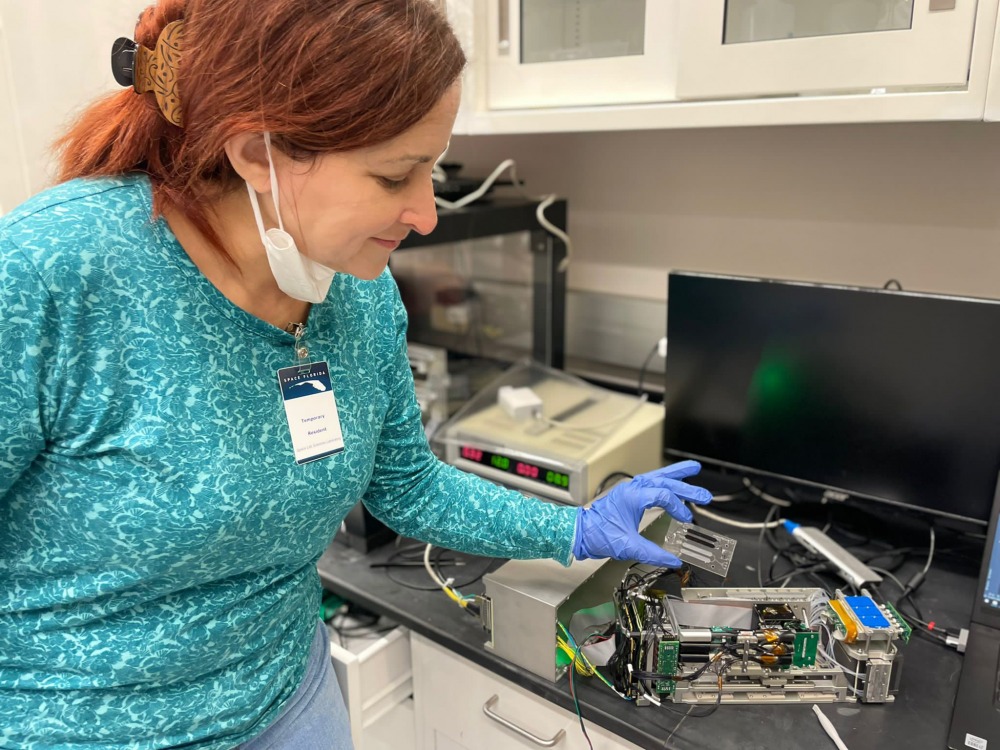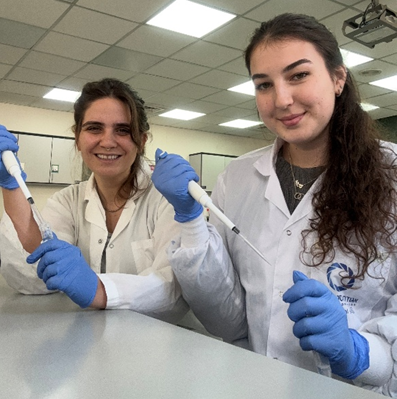
When Prof. Yechezkel (Chezy) Barenholz from the Department of Biochemistry and Molecular Biology at the Faculty of Medicine at the Hebrew University of Jerusalem co-invented Doxil®, a nano-drug for treating recurring ovarian cancer, he had no idea how far the drug would go – quite literally. Thanks to Prof. Sara Eyal from HU’s School of Pharmacy, Doxil® recently returned from a field trip to the International Space Station (ISS).
Doxil® was first approved by the American Food and Drug Administration (FDA) in 1995, making it the first nano-drug to be approved by the agency. Nearly three decades later, Doxil® continues to lead – globally and beyond! In early 2022, it became the first nano-drug to travel to space when it completed a one-month stay aboard the ISS.
To reach space, Prof. Eyal loaded the generic version of Doxil® (see below) into a miniature SpacePharma laboratory, where conditions could be monitored and controlled from Earth. The laboratory was launched on a Space X spaceship that routinely delivers supplies and scientific materials to the ISS.
Prof. Barenholz explains: “The nano-drug’s structure is based on nano-liposomes, a bubble in which an envelope of fat molecules that resemble the components of cell membranes encircle a small amount of water. Within this water there is the anti-cancer agent in the form of a unique single nano-rod crystal per each nano-liposome. The first aim of sending the nano-drug to space was to evaluate whether subjecting it to zero gravity would alter its complex structure. If so, the next step will be to determine whether these changes alter the drug’s therapeutic efficiency back on Earth.”
Prof. Eyal got her first taste of space medicine three years ago when she participated in a University of Washington project that was launched to space. This motivated her to establish the field of space medicine at Hebrew University. She took a sabbatical to work with SpacePharma, an Israeli company that specializes in sending tiny experiments to space. Today, her research combines sustainable research on Earth with projects conducted in space.
“Micro- and zero-gravity aren’t only for space exploration. These extreme conditions can also be used to achieve scientific advances in drug development, agriculture, and more,” she says.
Prof. Eyal conceived of and was the lead investigator on the study that sent generic Doxil® into space. Funded by Hebrew University and the Israel Space Agency, the experiment was a truly collaborative effort. Scientists involved include the School of Pharmacy’s Prof. Ofra Benny, who developed the organ-on-a-chip for carrying cancer cells to space; Prof. Uri Raviv from the Department of Chemistry who, along with Prof. Barenholz, will analyze the drug’s nano-structure upon returning to earth; and Prof. Tal Burstyn-Cohen from the Faculty of Dental Medicine, who will contribute her expertise in the mechanisms that cause changes within cells.
Prof. Eyal’s commitment to space medicine goes even further. She led the way to purchasing a zero-gravity simulator, which is located within the School of Pharmacy. Together with Prof. Ayal Ben-Zvi and Dr. Assaf Honig from Hadassah, Prof. Eyal uses the simulator to understand how gravitational changes cause brain damage in fighter pilots. She also studies the effect of microgravity on the uptake of essential compounds (e.g., glucose) and medications by human cells. She looks forward to involving high school students who participate in the University’s Mars Colony program in her projects.
Prof. Eyal is also the academic advisor of the Hebrew University rocketry club, and she encourages researchers to launch their experiments on sub-orbital rockets built by the students. Dr. Ronen Hazan of the Faculty of Dental Medicine has already taken her up on this invitation.
Lastly, aiming to inspire the next generation of researchers, Prof. Eyal teaches a class on space medicine. The course is the first of its kind in Israel, and students from across medical fields learn about space medicine and “translate” their research projects into zero-gravity conditions.
“What we learn in space directly translates to better understanding our bodies, medicines, and the interactions between them – ultimately, making life better on Earth!”
– Prof. Sara Eyal
Prof. Barenholz actually invented Doxil® twice.
The original innovative nano-drug was approved by the FDA in 1995 and has since been used extensively worldwide. Yet interestingly, while Prof. Barenholz’s patents formed the basis for Doxil®, the processes of large-scale production weren’t known to him.
After Doxil’s patents expired, together with Yissum (Hebrew University’s technology transfer company), Prof. Barenholz founded Ayana Pharma Ltd. with the aim of developing and producing liposomal drugs. Ayana Pharma successfully developed a generic version of Doxil®, known as Doxorubicin-HCI Liposome Injection. In late 2021, the FDA approved the drug, making it the company’s first to be approved. The generic drug is produced in Israel and sold in the United States.



